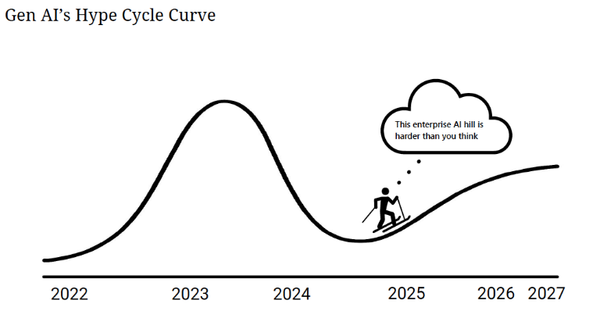Electrified - Issue 45
What does a NY deli have to do with energy?

Hi friends,
We’re back after a short break.
Let’s get to the week’s most interesting energy stories.
The Deep Dive
What does a NY deli have to do with energy?
In the 1960s, comedians convened to discuss shows at a deli in New York called Lindy. It was there they discovered that the life expectancy of a television comedian is inversely proportional to their frequency of appearance on the medium.
The Lindy Effect is the idea that the future life expectancy of non-perishable things like books, technologies, and ideas is proportional to their current age implying that for every additional period they survive, their life expectancy increases.
Our job in venture capital is to explore new technologies, and back the founders building them. But equally important, per the Lindy effect, is our understanding of the antifragile. We must understand what is hard to disrupt and becomes more resilient to change with time.
“What’s going to change in the next 10 years?” That is a very interesting question; it’s a very common one. I almost never get the question: ‘What’s not going to change in the next 10 years?’
And I submit to you that that second question is actually the more important of the two — because you can build a business strategy around the things that are stable in time.
-Jeff Bezos
What’s “Lindy” in Electricity
The need for reliability. This one is the most basic Lindy dynamics in energy, once we access reliable power we become accustomed to it, our lives are increasingly dependent on it, and it never goes in reverse. There are approximately 1B people globally who still do not have access to reliable power.
Grid flexibility - even if we get to a centralized baseload of clean power through storage, nuclear, or geothermal power, the power of flexibility will not break once it becomes common practice. Further, that flexibility is more likely to match supply to demand instead of curtailing demand to meet supply.
Specialized knowledge - the power and energy sectors have uniquely complex dynamics. This expresses itself in the vernacular (how many people understand a kWH?), the regulations, the incumbency, or bureaucracy. Technology has and will continue to make this more accessible so that anyone can learn it.
For example, think of Google Translate. You can now go to China and get by without ever learning a single word. Does this mean you learned the language and the rules that dictate it or could get by living in China? The appearance of specialization by tourists to the sector will make the actual knowledge more valuable because fewer people will believe they have to learn it.
Transportation and charging networks - we have an increasing desire to get from point A as cheaply and reliably as possible. Electric vehicles are on the path to becoming that option and once charging networks are in place they will be almost impossible to replace.
Convenience - the easier things become for consumers, the easier they expect them to be. This bar is EXTREMELY high in electricity because “it just works” - in most cases we flip a switch or press a button and we have power.
Heuristic regulations like protecting the consumer, and maybe soon, the environment. Regulations are inherently difficult to get passed and with good reason - we are incredibly poor at subtracting them post-implementation. Additionally, the politicians and regulators responsible for them have careers to protect and do not want to be seen as anti-consumer or environment.
Third-party data access is a great example, it took hold as a result of previous telecom regulations and has yet to be changed in order to meet the demands of today’s technology-driven grid.
We may not have a NY deli, but we have Twitter and Linkedin to discuss these trends. We know energy, like entertainment, is a dynamic industry. What concepts do you predict will stay the same and get stronger over time as the industry undergoes a once-in-a-lifetime transformation?
Electrified Podcast
This week, Matthew Nordan - Managing Director at Prime Impact Fund joined the podcast. We had a wide-ranging conversation about aligning incentives, techno-economics, and why the VC model grew tired of cleantech.
Did debate get you down? @matthewnordan of Prime Impact Fund joined us for one of the most uplifting conversations we've had to date on the Electrified podcast.
— Kevin Stevens (@kevindstevens) 2:03 PM ∙ Oct 8, 2020
podcasts.apple.com/us/podcast/ele…
Links
1.
For decades, one could argue, the Fed raised interest rates more in response to tight energy markets than tight labor markets. Because the U.S. has now achieved a certain kind of energy independence, those energy market constraints no longer exist as they did in the past, letting the Fed truly wait for signs of tight labor markets before raising rates.
— America’s Economy Has Broken the Curse of the ‘70s
2.
Instead, they’re using the notion that well-heeled clients — who often get personal attention from bank executives — could steer their networks of friends away from banks that invest in fossil fuels. And, they argue, shifting to invest in a greener economy would help attract more environmentally minded younger investors set to inherit $68 trillion.
— Oil scions rally wealthy peers to press banks on climate
3.
Microsoft represents a story of resilience that the energy and industrial vertical wants to embrace and believe. At one point, Microsoft was written-off as Google and Amazon charged ahead into the enterprise. And yet, under Satya Nadella’s leadership, Microsoft has roared back in the enterprise segment and is solidifying and expanding its’ technology footprint in these asset-heavy verticals.
— Microsoft: The Surprise Energy Wildcatter
Recent Investment Activity
Greenbird, a Norwegian digital integration hub for the utility market, raised €5 million in Series B funding from EnBW New Ventures, Nysno, and ETF Partners.
Bidgely, a developer of energy monitoring and management solutions for household appliances, received $8M in growth capital financing from CIBC Innovation Banking.
Beyond Limits, an industrial AI company built for sectors like energy, utilities and healthcare, announced a $113M Series C funding round. This round is led by Group 42, an AI and cloud computing company, and BP Ventures.
Eliq, a Swedish customer engagement platform in the utility space raised a 5M Euro Series A financing round co-led by Inven Capital and Contrarian Ventures.
Airly, a Palo Alto, CA- and Poland-based air quality monitoring service, raised $2M led by Giant Ventures.
HUVRdata, an Austin, Texas-based provider of industrial asset management solutions, raised $5 million in Series A funding. Cottonwood Venture Partners led, and was joined by Wild Basin Investments.
Redaptive, a San Francisco-based provider of energy efficiency-as-a-service solutions, raised $157 million. CarVal Investors led, and was joined by return backers CBRE, Engie New Ventures, Evergy Ventures, and Linse Capital.
💰Any deals we missed or you would like us to share? Submit them here.
SPAC’s and Exits
Ecobee, a home automation startup, is in talks to go public via merger with Canaccord Genuity Growth II Corp., a SPAC, per Bloomberg.
Romeo Systems, an electric battery company, plans to go public via merger with RMG Acquisition Corp. (NYSE: RMG), a SPAC. The combined company will be valued at about $1.3 billion.
Generac Holdings has signed an agreement to acquire Enbala Power Networks, a provider of distributed energy optimization and control software for power grids.
Quorum Software, a Houston-based portfolio company of Thoma Bravo, acquired Landdox, a Dallas-based provider of land management software.
What I’m thinking about
True self-confidence is the ability to look at the world without the need to find signs that you are right - to avoid looking for confirmation bias.
See you next weekend,
Kevin


